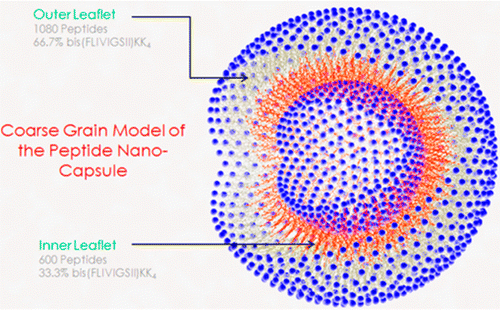Nano-spheres, olestra, and integrated testing strategies are a few of the topics being researched by SOT members that were featured on the Society’s social media channels this week.
SOT Member Research
 Researchers, including Robert P. Hanzlik, have found that peptide nano-spheres (pictured at right, photo credit: John M. Tomich/Kansas State University) can be used to store and transport harmful isotopes. The newly published research in Biochimica et Biophysica Acta describes how these nano-spheres retain radioisotopes without leakage, reducing the amount of nontargeted radioactive daughter ions released into the body during radiation therapies.
Researchers, including Robert P. Hanzlik, have found that peptide nano-spheres (pictured at right, photo credit: John M. Tomich/Kansas State University) can be used to store and transport harmful isotopes. The newly published research in Biochimica et Biophysica Acta describes how these nano-spheres retain radioisotopes without leakage, reducing the amount of nontargeted radioactive daughter ions released into the body during radiation therapies.
Olestra, a fat substitute commonly found in snack foods such as potato chips, may safely reduce body burdens of PCBs according to research in The Journal of Nutritional Biochemistry co-authored by James R. Olson.
Efforts to develop an integrated testing strategy (ITS) for identifying potential skin sensitizers without conducting animal tests have resulted in a new open source software implementation of an ITS based on a Bayesian network. Nicole Churchill Kleinstreuer, Thomas A. Burns Jr., Judy A. Strickland, Lori Rinckel, and Warren M. Casey are all authors on a short communication published by ALTEX, which describes the ITS model and software.
Certain engineered nanoparticles may damage DNA, according to new research in ACS Nano co-authored by Bevin P. Engelward. Using an assay known as CometChip, developed by Dr. Engelward and a colleague in 2010, the authors studied the effects of silver, zinc oxide, iron oxide, cerium oxide, and silicon dioxide nanoparticles on DNA and found dose-dependent increases in DNA damage.
SOT Members in the News
Pamela J. Lein, Ellen Fritsche, Steve Stice, Mary Alice Smith, Seth W. Kullman, Edward D. Levin, and Theodore Slotkin were recently awarded grants from the US EPA for research into the development and use of adverse outcome pathways that predict adverse developmental neurotoxicity.
Tshwane University of Technology spotlighted the 2014 SOT Annual Meeting and ToxExpo poster presentation of Salmon Adebayo, a doctoral degree candidate at the university, on its website. Mr.Adebayo’s presentation discussed the cytotoxicity of the extracts of plant species used to treat inflammation-related conditions in South Africa (Poster #785). His research found that the three tested extracts were not cytotoxic to kidney and liver cell lines when compared with the controls, but additional in vivo studies are needed.
Science Headlines
To stay abreast of these types of items throughout the week, be sure you “like” SOT on Facebook and “follow” SOT on Twitter.
Have news or research you want featured in the future? Send me an email.